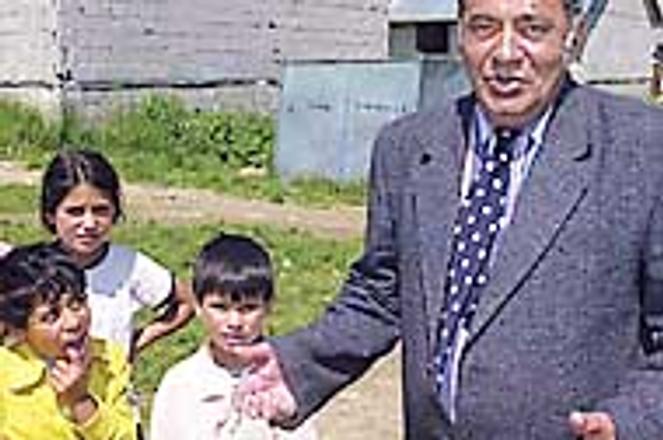THROUGHOUT the country activists are trying to get Roma involved politically.photo: TASR
WITH POLITICAL activism on the rise across the country in the run-up to September's vote, Slovakia's Roma minority, estimated to represent 4 per cent of the country's eligible voters, has been receiving increased attention in the already rancorous election campaign.
Mainstream political parties such as opposition Movement for a Democratic Slovakia (HZDS) and non-parliamentary New Citizens' Alliance (Ano) have highly visible Roma candidates and caucuses within their parties, but non-partisan efforts are also underway to get out the Roma vote, and ensure the votes are counted.
One program, run in cooperation between the Washington D.C.-based National Democratic Institute (NDI) and the Association of Roma Settlements in the Prešov Region, is engaging Roma communities and leaders throughout east Slovakia to explain the importance and mechanics of voting.
"Its very similar to the [Rock the Vote] program four years ago to mobilise young voters, but we're trying to mobilise Roma voters," said Peter Pollák, one of the project's leaders and deputy-director of the Spišská Nová Ves District Office with responsibility for Roma issues.
"We are holding a series of meetings in different Roma communities where we explain why it is important for Roma to go and vote. We are also explaining the basic elements and procedures of voting - that it is direct, secret and that every vote has the same value," he continued, adding that the campaign is strictly non-partisan.
One of the biggest problems, says Pollák, is not necessarily getting Roma voters to vote, but making sure they know how.
ROMA women from the Spiš region learn to help themselves.photo: Roma Press Agency
"In [last year's local] elections, maybe 70 or 80 per cent of eligible Roma voters went to the polls, but many of their votes weren't counted because they had been improperly cast.
"Some Roma, for example, can't read or write, so we explain what they can do, who they can go to for help," said Pollák, adding that an illiterate voter is permitted to take another eligible voter into the booth to offer assistance.
A key part of ensuring the Roma vote is counted, says Pollák, is getting representatives of Roma communities onto local election commissions - the ad hoc boards that oversee election administration at each individual polling place - to help Roma deal with literacy problems or other logistical difficulties.
"Very few Roma have ever been on election commissions, and we are explaining how they can get on. We are also explaining how the commission works, how the elections work, what election officials can do when someone wants to vote but is not listed in the voter registry." said Pollák.
Besides the mobilisation campaign for September's parliamentary elections, Pollák has also organised a training program for Roma who want to run in local government and regional parliamentary elections, scheduled for December.
This program, with 30 participants, is organised by the civic foundation Dôstojný život (Dignified Life) in the eastern Slovak town of Spišská Nová Ves, whose district contains some of Slovakia's most notorious Roma settlements.
"The first sessions were about law and how government works, who has what function in village and town administrations. Later we cover what people can accomplish as a member of regional or local government and related laws, so that if people run and are elected, they are ready to assume their function," explained Pollák, who is part of the training team.
"In other sessions we talk about the basics of social work; we also talk about media and running a campaign because, of course people have to get elected before they can do anything. We teach potential candidates how to speak to voters and journalists, how to present themselves on television, for example."
Another NDI-backed program, Improving Participation of Roma Women in Public Life, is training 15 women in Spišská and another 15 in eastern Slovak regional capital Košice to take on leadership roles in their communities, which for some means seeking public office.
"It is about giving these women practical skills and self confidence to help them in public and private life," said regional coordinator Mária Horňáková, adding that interest in the project had led to its doubling the number of participants to 30.
Concerns among the women differ in the two locations, said Horňáková, as many from the Košice group have university degrees and live in integrated urban areas, while some Spišská participants come from deeply problematic and geographically isolated settlements.
"But all of them want this training because they see problems around them that they want to solve," said Hornáková, adding that training in political candidacy is only part of the organisation's larger program to involve Roma women in developing their local environments.
"I think five or six [course participants] could make it to local government, and the rest should function in their communities as activists and organisers," she said.
"Local elections don't mean the end of this project, but only the beginning of creating abilities in the community."


